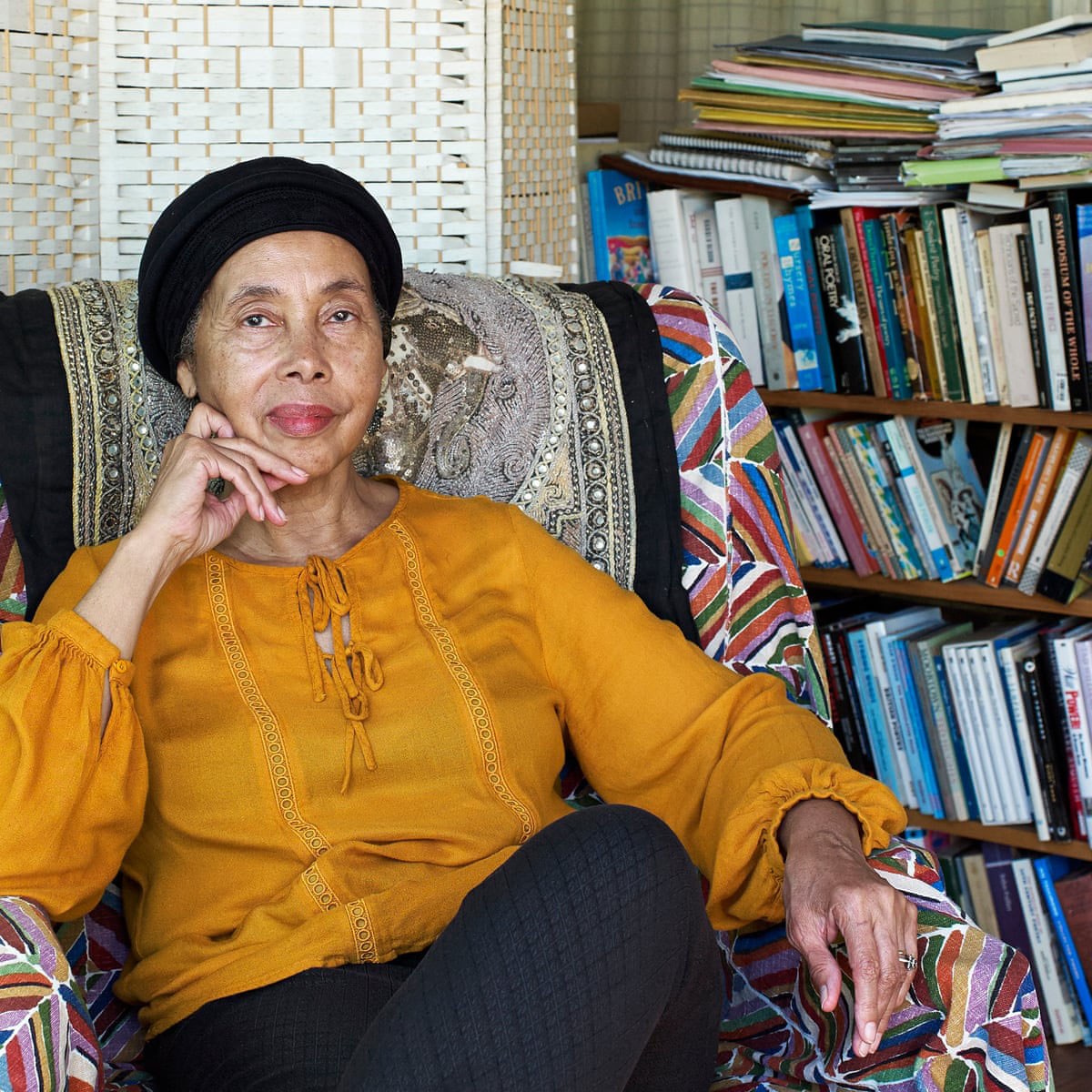Be it gold, it breaks.
Be it quetzal feather, it tears apart.
Not forever on earth; only a little while here.
Aztec Prayer
Introduction
Grace Nichols is among the fine West Indian poets. She is Guyanese, a prize-winning writer with published collections of poetry, one novel for adult audiences and several children’s books. She has built a prominent career in Great Britain where she lives and has been commissioned to read and perform her poems to secondary schools across the UK who study her work for their exams.
Nichols’ first volume of poetry I is A Long Memoried Woman (Karnak House, 1983) won the Commonwealth Poetry Prize. A later collection, Sunris (Virago, 1996), won the Guyana Prize for Poetry, and her first novel Whole of A Morning Sky (1986) was shortlisted for the Guyana Prize. Virago also published her other poetry collections The Fat Black Woman’s Poems (1984) and Lazy Thoughts of a Lazy Woman (1989).
I Is A Long Memoried Woman is a widely acclaimed West Indian work and includes some of the most memorable lines.
From dih pout
of mih mouth
from dih
treacherous
calm of mih
smile
you can tell
I Is a long memoried woman
is how the book begins, while it ends with the unforgettable “Epilogue”
I have crossed an ocean
I have lost my tongue
from the root of the old
one
a new one has sprung
But the poems we reproduce today are from one of her poetic works that is not very well known, even though it carries some of her finest lines and a thoroughly Caribbean voice – Startling the Flying Fish (Virago, 2005). It is a series of verses that are not titled, but are grouped under five numbered sections. Yet they are dominated by the voice, perhaps monologue, of an ageless all-seeing Teiresias-like persona who calls herself “I Cariwoma”, quite likely the incorporation of Caribbean Woman. She often refers to the people and place as her children, known and unknown, and assumes the characteristics of the region – its landscape, its population and, especially the sea.
Her several references identify her as a creature of the Caribbean – the islands, the sea, the history and the folklore. The title is testament to this – Startling the Flying Fish is an obvious reference to the fish for which the island of Barbados is famous and with which it is often associated as a national symbol. The poems in the book tell the story of the islands in several ways. Nichols uses the image of the duennes, supernatural spirits of children in Trinidadian folklore, and mentions the palmwine, a popular potent drink of Nigeria, whose heritage prevails in the West Indies.
The publishers describe the book as “symphonic”, which becomes evident in the sometimes lyrical dance of the verses, and confirms that this is “the voice of Cariwoma, a Caribbean woman who incarnates the spirit of the islands and the sea”. Nichols acknowledges a number of significant influences. They include Leonard Barrett whose The Sun and the Drum: African Roots in Jamaican Folk Tradition treats a number of indigenous traditions and beliefs at the roots of Caribbean culture. There is also gratitude to Earl Lovelace whose prize winning novel Salt also rests on important traditions and myth, and to Trinidadian Lawrence Scott’s novel Witch Broom. Nichols also quotes from an ancient prayer of the Aztecs (reprinted above), and mentions the Macusi, Wapishana and Warrau very relevant to her native land Guyana. The recognisable influence of Wilson Harris and Derek Walcott are also acknowledged.
Yet the themes and intertextual engagements are wide ranging. For example, Nichols engages the Indentured labourers who came to the Caribbean from China, India, Africa, Ireland and Portugal, as well as remnants and repercussions of the pre-Columbian. The tales she tells additionally resonate with relevant references to the “odyssey” (of Homer) and the moving story of the loyal and patient Penelope, who unpicked at night the work she did during the day.
We reproduce Part One of this carefully crafted volume of poetry by Nichols, bringing to attention a work that can become so easily lost within this poet’s voluminous output, but one which is a lively specimen dramatising profound elements of history, identity and definition in West Indian literature.
Grace Nichols,
Startling the Flying Fish
Part One
And I Cariwoma
watch my children
take off like
migrating spider-birds
carrying the silver threads
of their linkages,
making of me new
triangulars across Atlantic,
enmeshing me into
their metropolitan affairs –
A thought for one here,
A sigh for one there,
A pride for one somewhere.
Europe? North America?
Smiles at photos
of grands and greatgrands
I’ve never seen,
the children who shine like constellations
in my dreams.
For them all I must keep green.
My children are movers.
— —
See our sister – a haunter of beaches
Wearing her dress like a symbol?
Staring out to sea and across
the treatcherous Atlantic
to where her dreams lie in Miami.
Hear this trapped Persephone, perfumed
With the reckless arrogance of youth:
‘I will have my eternal summer of plenty.
I will leave these islands, this underworld
that would crown me Queen of Poverty
I will board that unseaworthy boat
matchboxed to a group I hardly know,
except they share my dreams of an El Dorado –
No twinking Arawak gold this time,
just a piece of life, upward and bright.’
And who has the heart to tell her
she’ll find no flowers in neon?
Who has the heart to tell her
that when she least expects it
her own backyard will swim
like a sea beside her?
That she won’t escape the voices,
The nuances – much like her mother’s blood.
— —
Yes, I Carowoma watched history happen
like a two-headed Janus,
however far apart heads can be.
The first head rose up
from the hammock’s languorous belly
and turned towards the winged ships
of Columbus’s faith,
his bright dreams which soon turned
for us into nightmares.
The other head rose up
from the misery ship, that other hammock,
and swivelled back, locking
as in the deformity of a duenne’s foot.
Face as faceless as a duenne,
those bewildered little souls
gazing back in limbo
at the shards of broken pots,
the waves of palmwine betrayal
Only the eyes of the sea-almonds
kept on beckoning –
A cautious welcome across new shores.
— —
But there were other ships
rocked by dreams
and fears and promise
Rolling
with new arrivals
across Atlantic.
From the fields
of Bengal
and Uttar Pradesh,
from Kowloon
and Canton.
From Madeira
And Ireland –
Their indentured mud-
stained feet, soon embroidered
like the slave’s instep to the fields.
Their songs of exile
their drums of loss
all caught in a weaving odyssey
of no return.
No waiting Penelope
unpicking all her work.











